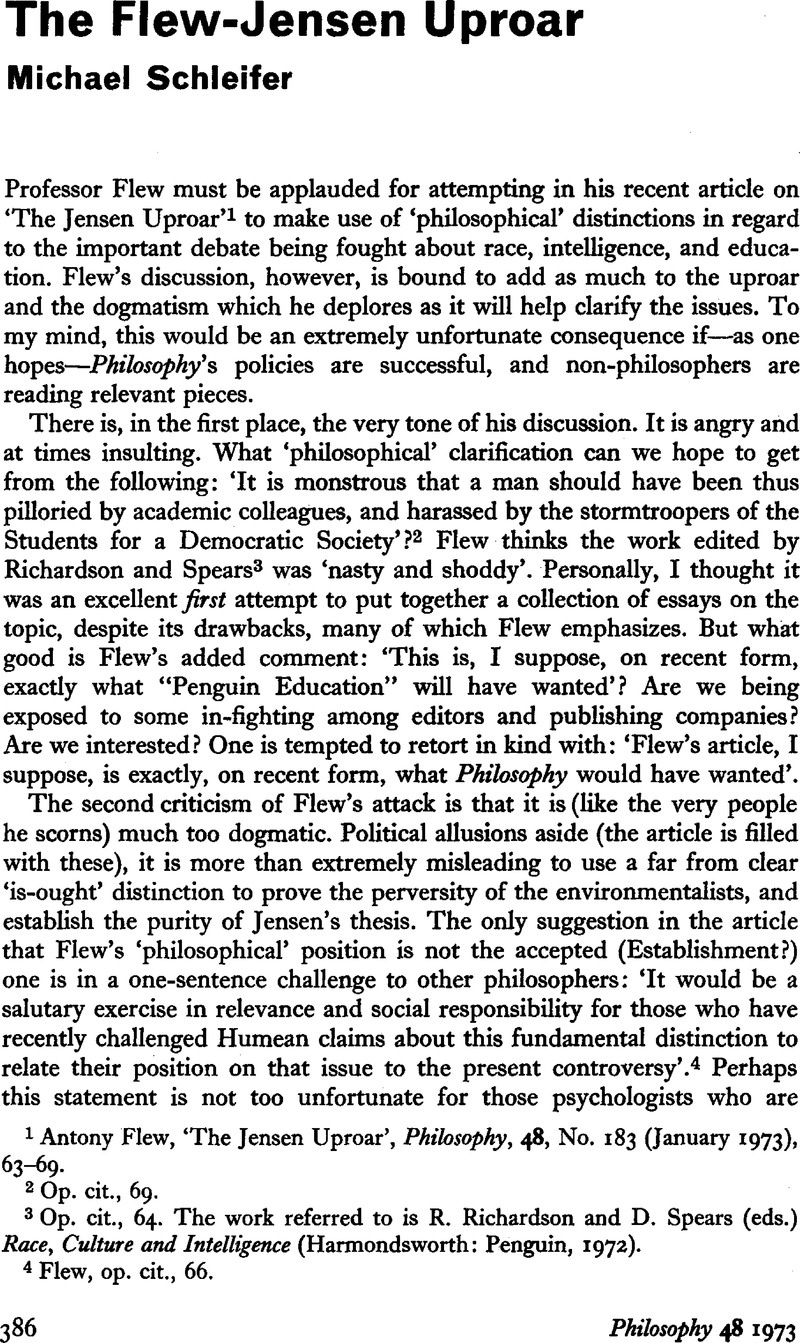Article contents
The Flew-Jensen Uproar
Published online by Cambridge University Press: 25 February 2009
Abstract

- Type
- Discussion
- Information
- Copyright
- Copyright © The Royal Institute of Philosophy 1973
References
1 Flew, Antony, ‘The Jensen Uproar’, Philosophy, 48, No. 183 (01 1973), 63–69.CrossRefGoogle Scholar
2 Op. cit., 69.
3 Op. cit., 64. The work referred to is Richardson, R. and Spears, D. (eds.) Race, Culture and Intelligence (Harmondsworth: Penguin, 1972).Google Scholar
4 Flew, , op. cit. 66.Google Scholar
5 These different aspects of the controversy are discussed in a work mentioned in a footnote by Flew (66n): Hudson, W. D. (ed.) The Is/Ought Question (London: Macmillan, 1969).CrossRefGoogle Scholar Flew is General Editor of this series.
6 Flew, , op. cit., 63.Google Scholar
7 Jensen's original article entitled ‘How Much Can We Boost IQ and Scholastic Achievement? was published in 1969 in the Harvard Educational Review, 39, No. 1.Google Scholar His controversial recommendations for differential education are still being discussed by psychologists. (See, for example, Schulte, Thomas R. et al. , ‘Effect of Age, Social Class, and Suggestion to Cluster on Free Recall’ Developmental Psychology, 8, No. 1, 1973.)Google Scholar
8 Flew himself quotes Jensen's ‘personal philosophy’ as wanting to do research which would ‘bear on practical as well as theoretical problems’ (op. cit., 69). The very title of his original article, and the recent collection in which it is reprinted (Genetics and Education) hint at Jensen's flirtation with the very fallacy Flew uses to save him.
9 See Foot, Philippa, ‘Moral Beliefs’Google Scholar, in Hudson, (ed.) op. cit., 196.Google Scholar See also Hudson's discussion of this point on p. 28.
10 These kinds of considerations are not illegitimate in controversial cases such as the one here discussed. (See Schleifer, M.: ‘Psychological Explanations and Personal Relations’, in Montefiore, A. (ed.) Philosophy and Personal Relations (London: Routledge, 1973).)Google Scholar
11 Flew, , op. cit., 66.Google Scholar
12 The Wechsler Intelligence Scale for Children (The Psychological Corporation, 1949), p. 94.
13 I am indebted to Dan Sullivan for pointing this out to me.
14 Hudson, , op. cit., 11.Google Scholar
15 In Mischel, Theodore, Cognitive Development and Epistemology, Academic Press, 1971.Google Scholar Kohlberg's contribution, along with one by R. S. Peters and comments by William Alston forms Part II of the book (pages 151 to 284).
16 For example in his 1879 article ‘What Psychology Can Do For the Teacher’, which is quoted at length in Kohlberg, L. and Turrel, Elliot, ‘Moral Development, Moral Education’, in Lesser, G. (ed.) Psychology and Educational Practice (Scott, Foresman Company, 1971), 413.Google Scholar
- 1
- Cited by




